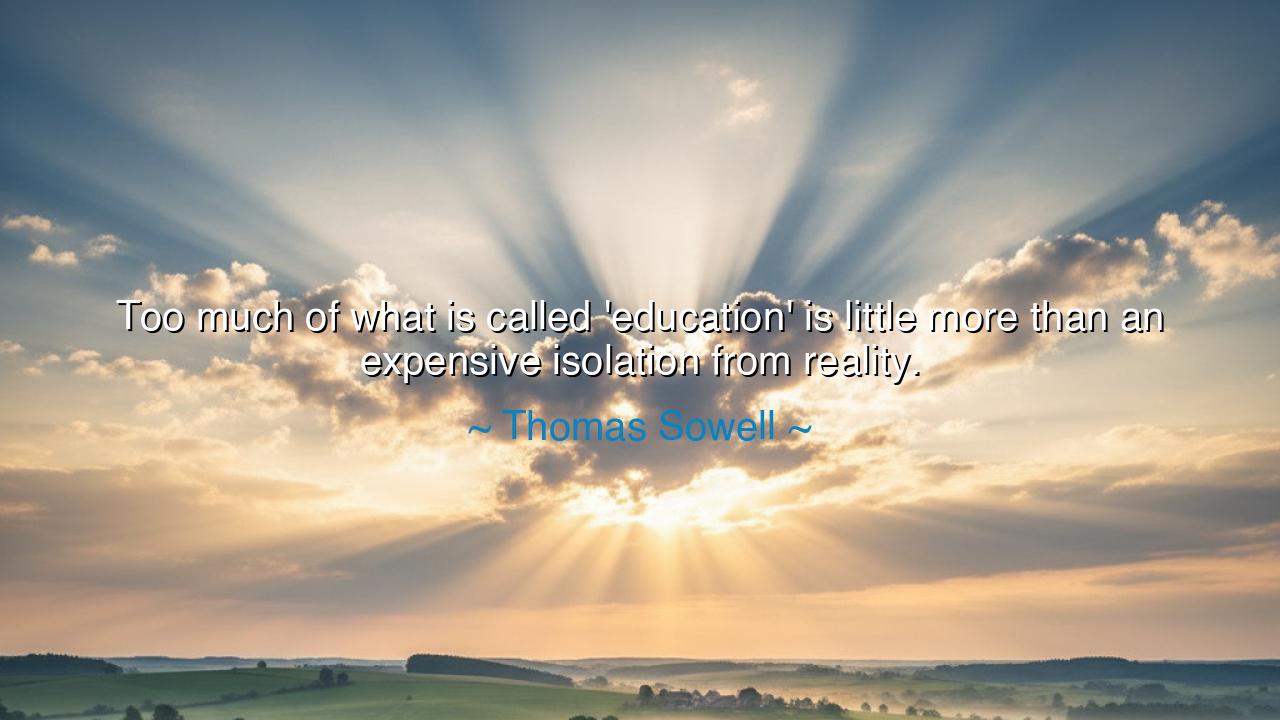
Too much of what is called 'education' is little more than an
Too much of what is called 'education' is little more than an expensive isolation from reality.






"Too much of what is called 'education' is little more than an expensive isolation from reality." These words of Thomas Sowell, the renowned economist and philosopher, cut through the illusions of modern learning like a blade through fog. Beneath their sharpness lies a sobering truth: that much of what passes for education today has drifted far from its original purpose—to prepare human beings for life itself. Sowell warns that when learning becomes detached from reality, when it no longer serves the living struggles of the world but only the vanity of prestige, it ceases to enlighten and begins to blind. The cost, he says, is not merely financial—it is moral, intellectual, and societal.
Thomas Sowell’s words were born from observation and experience. Raised in poverty during the Great Depression, he rose through hardship and self-discipline to study at Harvard, Columbia, and the University of Chicago. Yet, he often spoke of how the world’s most “educated” minds could be ignorant of the most basic truths of life—of work, struggle, and responsibility. He saw in the universities a growing class of intellectuals who spoke endlessly about justice and economics, yet had never labored, risked, or lived among the people their theories affected. To him, education without reality was like a tree without roots—beautiful in appearance, but easily toppled by the first wind.
History offers countless examples of Sowell’s warning made flesh. In the 20th century, ideologues in universities across Europe wrote glowing theories about human equality and progress—ideas that, once divorced from reality, helped pave the way for totalitarian regimes. The architects of these systems were often highly educated men—brilliant in intellect, yet blind in wisdom. They designed societies not as they were, but as they imagined them to be. The result was disaster. Their education, cut off from the soil of human experience, became a weapon of illusion, not enlightenment. The tragedy of such scholars is precisely what Sowell sought to expose: that education, when isolated from truth, becomes expensive ignorance.
The ancients understood what Sowell was rediscovering. In Greece, Plato warned that the philosopher must not live forever in the cave of thought, but must return to the sunlight of the world, to act and serve. In Rome, Marcus Aurelius ruled wisely because his philosophy was forged not in isolation but in the heat of command and war. Knowledge without practice, they knew, breeds arrogance; knowledge joined with experience breeds wisdom. For education to be worthy of its name, it must bridge the chasm between mind and matter, between the scholar and the soil.
Sowell’s critique also reflects the spiritual ailment of the modern age: that we value titles over truth, institutions over insight. The expensive isolation he speaks of is not only the cost of tuition—it is the cost of detachment. A student may graduate with honors and yet be unfit for the real world, unable to think beyond memorized formulas or navigate the complexities of human nature. Meanwhile, the farmer, the craftsman, the mother raising children—all possess a kind of education the university cannot teach: one born of effort, humility, and contact with the real. It is this loss of connection, this elevation of abstraction over experience, that Sowell mourns.
Yet his message is not a rejection of learning—it is a call to redeem it. Education must once again serve life, not escape from it. The scholar must walk among the people, the student must question not only what is taught but why, and every learner must test their knowledge against the stubbornness of the real world. For truth, Sowell reminds us, is not found in theories alone, but in their consequences. A lesson not lived remains unlearned.
Let this teaching be passed down to all who seek wisdom: seek not the safety of ivory towers, but the courage of engagement. Read deeply, but live deeply too. Let your education be a fire that illuminates, not a wall that separates. Remember always that knowledge without action is emptiness, and that the true scholar is not the one who escapes the world, but the one who understands it, serves it, and transforms it. For as Thomas Sowell warned, when education loses its tether to reality, it ceases to be education at all—it becomes an illusion dressed in robes, and the world pays dearly for believing it.






AAdministratorAdministrator
Welcome, honored guests. Please leave a comment, we will respond soon